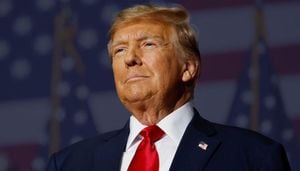The tragic deaths of 14 soldiers from the South African National Defence Force (SANDF) during their deployment in the eastern Democratic Republic of Congo (DRC) has ignited intense debate within South Africa's political sphere. The SANDF, which was already facing scrutiny for its operational preparations, found itself at the center of controversy after engaging with the Rwanda-backed M23 rebels.
During recent parliamentary discussions, political parties voiced their frustrations over the SANDF's involvement, with calls growing louder for the troops' swift return home. Defence Minister Angie Motshekga defended the troop deployment, stating it aligns with South Africa's foreign policy commitment to contributing to peace and stability within the continent. “Helping to create stability in eastern DRC is also in SA’s interests,” she claimed, underscoring the importance of preventing potential refugee flows resulting from the conflict.
Opposition parties, including the Democratic Alliance (DA) and the Economic Freedom Fighters (EFF), were quick to criticize the deployment, asserting it was poorly planned and executed. Chris Hattingh, the DA's defence spokesperson, articulated the dissent, stating, “They fought alongside the DRC armed forces against the well-trained, well-equipped M23 rebels, yet their own government sent them to war unprepared.” Hattingh’s remarks echoed earlier sentiments shared across various political factions, expressing deep concern over inadequate support for the troops.
Julius Malema, EFF leader, vehemently asserted, “South Africa cannot afford to lose any more lives. Our troops must be brought home immediately.” He emphasized the risk of exposing SANDF forces to active combat with the M23 rebels, who had shown superiority both numerically and logistically. Malema’s position reflects the frustrations of many South Africans who question the rationale behind the continued military engagement, particularly as the safety of their soldiers becomes precarious.
Defence Minister Motshekga responded by highlighting South Africa’s historical role as peacekeepers on the continent since 1994, stressing, “we adopted a foreign policy... contributing to peace and stability on the continent.” She underscored the importance of remaining engaged to assist the DRC, linking this commitment to broader regional security interests.
Contradicting Motshekga, the Minister of International Relations and Cooperation, Ronald Lamola, warned against the immediate withdrawal of SA troops. He reckoned such action could lead to exposure and potential ambush by various armed groups present within the conflict area. “An abrupt withdrawal of SA forces from DRC as MPs had called for is even worse than surrender,” Lamola remarked, advocating patience to allow for diplomatic solutions backed by regional community discussions.
Despite the government’s stance, many MPs have expressed concerns over resource allocation and military preparedness. Past failures, such as the Battle of Bangui where South Africa lost 15 soldiers back in 2013, have not been forgotten by critics. “How can the President make commitments to deploy our poorly armed soldiers, ostensibly for peacekeeping purposes, fully knowing our SANDF is not combat ready?” questioned DA deputy defence spokesperson Maliyakhe Shelembe, driving home the inadequacy of military preparedness as being central to the entire debacle.
The SANDF’s involvement has not only drawn ire for operational strategy but also highlights the interplay of regional geopolitics and the complex relationship between South Africa and the DRC. The situation remains volatile, with fears of broader regional instability. Political analysts caution against the unforeseen consequences of either withdrawal or sustained involvement without proper provisions and support.
Adding another layer to the discourse, the call for military reform resonates across the political spectrum. There are demands for assessments of defense strategies and logistics, particularly as the SANDF faces allegations of being ill-prepared for real combat situations where their safety is at stake. The sentiments echoed by former commanders and defense analysts stress the importance of ensuring soldiers are not sent to the frontlines with insufficient backing.
The parliamentary debates revealed stark divisions but also underscored collective anxiety for the troops stationed away from home. Questions remain about the future of South African involvement and the urgent need for reforms. “If these were your children, would you send them to DRC?” asked Bosa leader Musi Maimane, capturing the essence of parental concern mirrored across many families.
Looking forward, active discussions surrounding South African military redeployment, efficiency, and the overarching aim of peacekeeping will shape the narrative for the foreseeable future.
Through the conflicting views expressed, it becomes pivotal for the South African government to evaluate its strategic priorities and assess its role within the dynamic political terrain of the DRC conflict.



